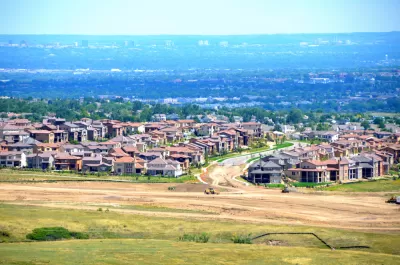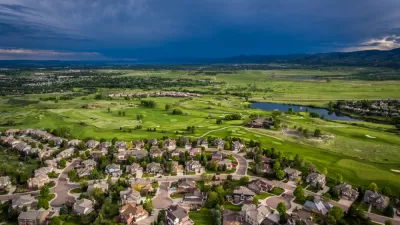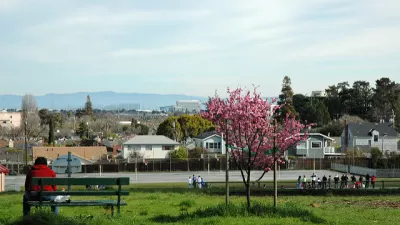In a scathing response to arguments in favor of a "slow growth" ordinance in Lakewood, Colorado, Mike Eliason rebukes the idea that capping growth is a green policy.

The city of Lakewood, Colorado recently made waves by approving strict caps on residential development, a policy some environmental activists supported. "To anyone who has been paying attention to the housing crisis across the country, the outcomes of such an act will be quite obvious," Mike Eliason writes. "Home values will continue to escalate, affordability will not improve, rents will go up, commutes will get longer, homelessness will increase."
In addition to the policy's potential social and economic pitfalls, Eliason says it's preposterous to view "slow growth" measures as environmentally friendly. He writes, "the cap does not apply to business and commercial properties. What this means is that the city can continue to add jobs at a staggering clip, but the housing that should be added to balance those jobs in the city, will be forced to be located outside the city."
Eliason ridicules the idea that "forcing 4,000 more people to drive into the city for work, life, sports, school" can constitute a plan for climate action. "In fact, it is the exact opposite of a climate action plan, and here is why. Lakewood's own 2015 carbon emissions inventory shows that as it has gotten denser, its carbon footprint has actually gotten smaller."
Calling Lakewood's anti-development policies "a form of climate arson," Eliason also points out that they can be racially and economically discriminatory, foisting the burdens of auto-centric sprawl on youth, the poor, and people of color while preserving the benefits for well-off mostly-white homeowners.
FULL STORY: A growth cap is Climate Arson

Maui's Vacation Rental Debate Turns Ugly
Verbal attacks, misinformation campaigns and fistfights plague a high-stakes debate to convert thousands of vacation rentals into long-term housing.

Planetizen Federal Action Tracker
A weekly monitor of how Trump’s orders and actions are impacting planners and planning in America.

San Francisco Suspends Traffic Calming Amidst Record Deaths
Citing “a challenging fiscal landscape,” the city will cease the program on the heels of 42 traffic deaths, including 24 pedestrians.

Adaptive Reuse Will Create Housing in a Suburban Texas Strip Mall
A developer is reimagining a strip mall property as a mixed-use complex with housing and retail.

Study: Anti-Homelessness Laws Don’t Work
Research shows that punitive measures that criminalized unhoused people don’t help reduce homelessness.

In U.S., Urban Gondolas Face Uphill Battle
Cities in Latin America and Europe have embraced aerial transitways — AKA gondolas — as sustainable, convenient urban transport, especially in tricky geographies. American cities have yet to catch up.
Urban Design for Planners 1: Software Tools
This six-course series explores essential urban design concepts using open source software and equips planners with the tools they need to participate fully in the urban design process.
Planning for Universal Design
Learn the tools for implementing Universal Design in planning regulations.
Heyer Gruel & Associates PA
JM Goldson LLC
Custer County Colorado
City of Camden Redevelopment Agency
City of Astoria
Transportation Research & Education Center (TREC) at Portland State University
Jefferson Parish Government
Camden Redevelopment Agency
City of Claremont




























